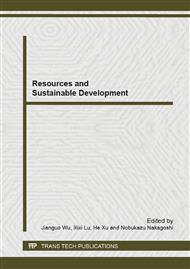
Ecological civilization city was made up of population, resources, environment, economic compound system, is a multi-function, multi-level and multi-objective evaluation objects. Construction of ecological civilization city is the request of the ages; it is a profound reflection on the industrial revolution, human development model. Ecological city is the result of human ecological value orientation, the inevitable trend in the development of future city. Ecological civilization city will become the ecological civilization construction and the main development direction of modern city and the pursuit of goals in the 21st century. This article begins with the concept and connotation of ecological civilization city, it obtains seven concrete construction of index, they are the ecological environment, ecological economy, ecological livable, ecological philosophy, ecological culture, ecological political, ecological infrastructure and ecological law, and specific construction method is given according to the characteristics of different indicators.
You might also be interested in these eBooks
Info:
© 2013 Trans Tech Publications Ltd. All Rights Reserved
[1]
Wackernagel M, Onisto L, Bello P, et al. National Natural CapitalAccounting with Ecological Footprints Concept [J]. Ecological Economics, 1999, 36(29): 375-390.
DOI: 10.1016/s0921-8009(98)90063-5
Google Scholar
[2]
Lu Jin.Brief Talk on Construction of Ecological and Civilized City [J]. Evironmental Science Survey, 2007, 26(z1): 19-20.
Google Scholar
[3]
Han Jian, Xie Haiping, Hu Changmin. Construction of ecological Civilization,Wenzhou City [J]. Environmental Management of China, 2011(4): 56-59.
Google Scholar
[4]
Wang Jiaqui. A Discussion of Eco-civilization City and it's Evaluation Index System [J]. Urban Studies, 2012, 19(9): 14-16.
Google Scholar
[5]
Chen Xiaodan, Che Xiuzhen, Yang Shunshun, Wu Bin. Study on Eco-Civilization Construction Evaluation of Developed Cities [J]. Ecological Economy, 2012(7): 52-56.
Google Scholar
[6]
Monfreda C, Wackemagel M. Establishing National Natural Capital Accounts based on Detailed Ecological Footprint and Biological Capacity Assessments [J]. Land Use Policy, 2004, 21(3): 231-246.
DOI: 10.1016/j.landusepol.2003.10.009
Google Scholar
[7]
Qian J, Yu L Z. Study on Contribution of CO2 Emissions from Fossil Fuel in Shanghai [J]. Shanghai Environmental Sciences, 2003, 22(11): 836-839.
Google Scholar
[8]
Global Footprint Network. National Footprint Accounts 2006 Accademic Edition[EB/OL]. http://www.footprintnetwork.org/gfn_sub.php?content=nrb.
Google Scholar
[9]
H. Chenery, S. Robinson, M. Syrquin. Industrialization and Growth:a Comparative Study[M]. Oxford University Press, 1986.
Google Scholar
[10]
Rees W E. Ecological footprints and appropriated carrying capacity: What urban economics leave out [J]. Environment Urban, 1992, 4(2): 120-130.
DOI: 10.1177/095624789200400212
Google Scholar


